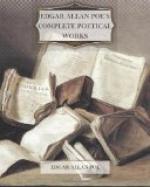Aless. Heard I aright?
I
speak to him—he speaks of Lalage?
Sir
Count!
(places
her hand on his shoulder)
what
art thou dreaming?
He’s
not well!
What
ails thee, sir?
Cas.(starting). Cousin! fair cousin!—madam!
I
crave thy pardon—indeed I am not well—
Your
hand from off my shoulder, if you please.
This
air is most oppressive!—Madam—the
Duke!
Enter Di Broglio.
Di Broglio. My son, I’ve news
for thee!—hey!
—what’s
the matter?
(observing
Alessandra).
I’
the pouts? Kiss her, Castiglione! kiss her,
You
dog! and make it up, I say, this minute!
I’ve
news for you both. Politian is expected
Hourly
in Rome—Politian, Earl of Leicester!
We’ll
have him at the wedding. ’Tis his first
visit
To
the imperial city.
Aless. What! Politian
Of
Britain, Earl of Leicester?
Di Brog. The same, my love.
We’ll
have him at the wedding. A man quite young
In
years, but gray in fame. I have not seen him,
But
Rumor speaks of him as of a prodigy
Pre-eminent
in arts, and arms, and wealth,
And
high descent. We’ll have him at the wedding.
Aless. I have heard much of this
Politian.
Gay,
volatile and giddy—is he not,
And
little given to thinking?
Di Brog. Far from it, love.
No
branch, they say, of all philosophy
So
deep abstruse he has not mastered it.
Learned
as few are learned.
Aless. ’Tis very strange!
I
have known men have seen Politian
And
sought his company. They speak of him
As
of one who entered madly into life,
Drinking
the cup of pleasure to the dregs.
Cas. Ridiculous! Now I
have seen Politian
And
know him well—nor learned nor mirthful he.
He
is a dreamer, and shut out
From
common passions.
Di Brog. Children, we disagree.
Let
us go forth and taste the fragrant air
Of
the garden. Did I dream, or did I hear
Politian
was a melancholy man?
(Exeunt.)




